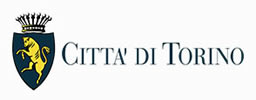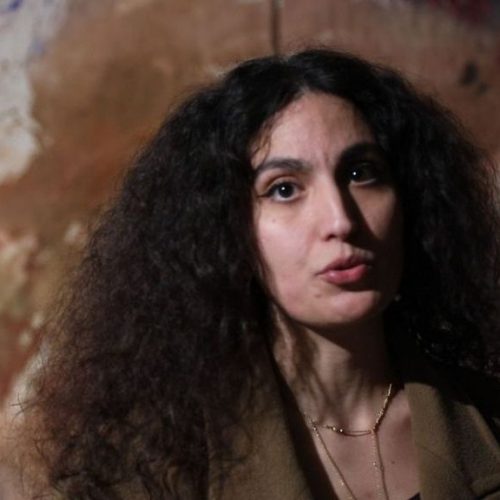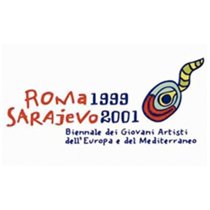
IX BIENNIAL OF YOUNG ARTISTS FROM EUROPE AND THE MEDITERRANEAN – ROMA 1999
10 Aprile 1999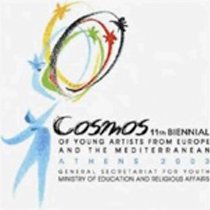
XI BIENNIAL OF YOUNG ARTISTS FROM EUROPE AND THE MEDITERRANEAN – ATHENS 2003
10 Aprile 2003X BIENNIAL OF YOUNG ARTISTS FROM EUROPE AND THE MEDITERRANEAN – SARAJEVO 2001
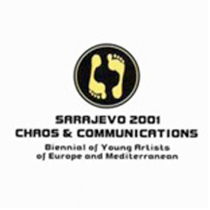
17-26 July 2001
This editions was linked to the previous one, that was held in Rome, because the two cities candidates together. In 1998 the two cities organized in Sarajevo six workshops that involved 100 artists and in 1999, during the Biennial in Rome, was launched a competition for the design of the new Sarajevo Concert Hall.
In Sarajevo, after many years of work, the International Committee decided to give birth to the International Association BJCEM – Biennale des Jeunes Créateurs de l’Europe et de la Méditerranée. Its legal seat was set in Brussels and its operative center in Turin.
Theme: Chaos and Communication
Sarajevo needed the Biennial to be held immediately after the war and after the besiegement of the city so that the entire community of the city would move into the 21st Century with a new attitude towards the world of art, as well as a new attitude about the experience that Sarajevo was going through.
For the Bosnian artist and citizens the Biennale met the need to express, in an authentic way, their relationship to the contemporary world, which was witnessing, through the eyes of cameras, the murdering of the city and its citizens every day.
Therefore, it was logical that the 10th Biennial should be organized under the title Chaos and Communication.
The disciplines in this edition were: Design, Music, Film, Literature, Visual Art, Gastronomy, Performing Arts.
Numbers
The Biennial hosted more than 700 artists from 28 Countries (Albania, Algeria, Bulgaria, Bosnia-Herzegovina, Croatia, Cyprus, Egypt, Finland, France, Greece, Hungary, Italy, Lebanon, Macedonia, Malta, Moldova, Portugal, Romania, Republic of San Marino, Slovenia, Spain, Syria, Tunisia, Turkey, Ukraine, Kosovo, Montenegro, Serbia).
Among them, to be signaled: Leyla Gediz, visual artist from Istanbul, Anur Hadžiomerspahić, visual artist from Sarajevo, Leonor Hipólito, applied artist from Lisbon, Les Gens du Quai Compagnie, performing art company from Montpellier, Islavica Panić, visual artist from Belgrade, Trio Design Sarajevo, a group of designers from Sarajevo, Fabrizio Turetta, live artist and theatre director from Padua, Zimmerfrei, performers and video-makers from Bologna.
Venues
The Biennial occupied different venues in the city. Generally, each venue was dedicated to a single discipline: the Svrzo House hosted the Literature readings, the Skenderija Center was set up to host the Gastronomy section, the Jajce barracks, the former soldiers’ dormitories, which had been transformed into a centre of Modern Art, hosted the Fashion shows and the Art exhibition and the Student House hosted the Performances.
Albania: Albanian Youth Council, Ministry of Culture, Soros Foundation; Algeria: Association ABIT; Bosnia-Herzegovina: International Winter Festival of Sarajevo, Association Marco Polo; Croatia: Museum of Modern and Contemporary Art; Cyprus: Ministry of Education and Culture; Egypt: Ministry of Culture; Finland: City of Helsinki; France: Espace Culture, C.R.E.A. Sud, City of Lyon, City of Montpellier, Agglomeration Toulon Provence Méditerranée; FYROM: Association for International Youth Cooperation; Greece: Ministry of National Education, City of Thessaloniki; Jordan: Ministry of Culture; Kosovo: Kosovar Youth Council; Israel: City of Tel-Aviv; Italy: ARCI Italy, ARCI Arezzo, ARCI Bari, ARCI Brescia, ARCI Catanzaro, ARCI Florence, ARCI Friuli Venezia Giulia, ARCI Lazio, ARCI Lecce, ARCI Livorno, ARCI Milan, ARCI Naples, ARCI Perugia, ARCI Pescara, ARCI Reggio Emilia, ARCI Salerno, ARCI Turin, ARCI Sicily, City of Ancona, City of Arezzo, City of Bologna, City of Campobasso, City of Caserta, City of Catania, City of Catanzaro, City of Ferrara, City of Florence, City of Forlì, City of Genoa, City of Grosseto, City of Messina, City of Milan, City of Modena, City of Padua, City of Palermo, City of Parma, City of Pisa, City of Prato, City of Reggio Emilia, City of Rome, City of Siracusa, City of Turin, City of Trieste, City of Udine, City of Venice, City of Naples; Lebanon: Groupe Rafif; Malta: Association Inizjamed; Morocco: Ministry of Education; Palestine: Ministry of Culture and Arts; Portugal: Clube Portugues de Artes e Ideias; Republic of San Marino: Public Education Department; Syria: Walkside Theatre Association; Slovenia: Association SKUC; Spain: City of Almeria, City of Barcelona, City of Cadiz, City of Madrid, City of Malaga, City of Murcia, City of Seville, City of Valencia, RAI Barcelona; Turkey: Sabanci University
Organizers
General Director
Ibrahim Spahic
Program Coordinator
Danka Ilic, Edin Alic, Maja Budimir, Larisa Hasanbegovic, Adla Isanovic
Catalogue
Oonagh Tyrrell
Media
Ivica Pjanic
Financial Consultant
Nermina Kulenovic
Technical Office
Marijela Margeta, Mihret Alibasic, Muret Begovic
Advisors
Nihad Cengic, Lamila Simsic
Protocol
Aida Bahtanovic
Secretariat
Vesna Felec, Alma Gojak, Alma Pintol
Organizers
Muhidin Hamamdzic – Mayor of Sarajevo
Ibrahim Spahic – President of the International Committee and Director of the Biennial of Sarajevo
Mustafa Pamuk – President, Canton of Sarajevo
Gradimir Gojer – Minister of Culture, Canton of Sarajevo
Partners
International Peace Center “Sarajevo Winter”:
Ibrahim Spahic – President
Danka Ilic – Program Coordinator
Tvrtko Kulenovic – Director of the Board
ARCI Nuova Associazione
Antonio Benetollo – National President
Flavio Mongelli – National Head of International Relations
Francesco Scalco – National Office for Culture
Alessandro Stillo – Responsible for Sarajevo Biennial
La Sapienza University (Rome) and University of Lecce:
Stefano Cristante – Founder of the Biennial
Members
Beriz Belkhic – Member of the B-H Presidency, Former Prime Minister of the Canton of Sarajevo; Alija Behmen – Prime Minister of the Federation of Bosnia and Herzegovina; Mustafa Pamuc – Governor of the Canton of Sarajevo; Huso Hadzidedic – Prime Minister, Canton of Sarajevo; Gradimir Gojer – Minister for Culture and Sport, Canton of Sarajevo; Muhidin Hamamdzic – Mayor of Sarajevo; Mira Jadric Vinterhalter – Chair of The City Council; Fehim Skaljic – Mayor of Stari Grad Municipality; Ljubisa Markovic – Mayor of Centar Municipality; Damir Hadzic – Mayor of Novi Grad Municipality; Zeljko Komsic – Mayor of Novo Sarajevo Municipality; Husein Mahmutovic – Mayor of Ilidza Municipality; Halid Bajric – Municipality of Hadzici; Nusret Masic – Municipality of Ilijas; Abdulah Ovcina – Municipality of Vogosca; Dervo Aljevic – Municipality of Trnovo; Mujo Demirovic – Minister of Education, Science Culture and Sport of the Federation of Bosnia and Herzegovina; Mitar Novakovic – Minister of Science And Culture; Neven Tomic – Mayor of Mostar; Midhat Haracic – Former Governor of the Canton of Sarajevo; Rasim Gracanovic – Former Mayor of Sarajevo; Ante Zelic – Former Deputy Mayor of Sarajevo; Amira Kapetanovic – Former Minister of Culture of the Canton of Sarajevo; Mustafa Mujezinovic – Former Prime Minister of the Canton of Sarajevo; Esma Hadzagic – Former Minister for Culture of the Canton of Sarajevo; Sadik Hasanbegovic – Manager of Skenderija Culture and Sports Center; Muhamed Besic – Ministry of Internal Affairs of Bosnia and Herzegovina; Ludomilla Braco Alikalfic – Association of Architects, Canton of Sarajevo; Boris Tihi – Rector of Sarajevo University; Amela Saric – Manager of the Pavarotti Center, Mostar; Omer Kulic – Director Air Bosnia; Ibrahim Jusufranic – Director JP Gras Sarajevo; Muhamed Saciragic – Director of Centrotrans; Sahid Jamakovic – Director of the Institute for Cantonal Urban Planning; Bakir Izetbegovic – Director of the Institute for Construction of Canton of Sarajevo; Velida Celic Cemerlic – Director of the Institute for Monument Protection of Canton Sarajevo; Muhamed Hamidovic – Director of the Institute for Monument Protection of Bosnia and Herzegovina Federation; Dzeko Semsudin – Tourist Association of Canton of Sarajevo; Meliha Husedzinovic – Art Gallery of Bosnia and Herzegovina; Babic Selim – Acting Director of “Rad” Company; Fuad Strik- Coca-Cola Co.; Fadil Njemcevic – Sarajevo Insurance Co.; Fejsal Hrustanovic – Bosnia and Herzegovina Insurance; Amir Spahic (PTT)
